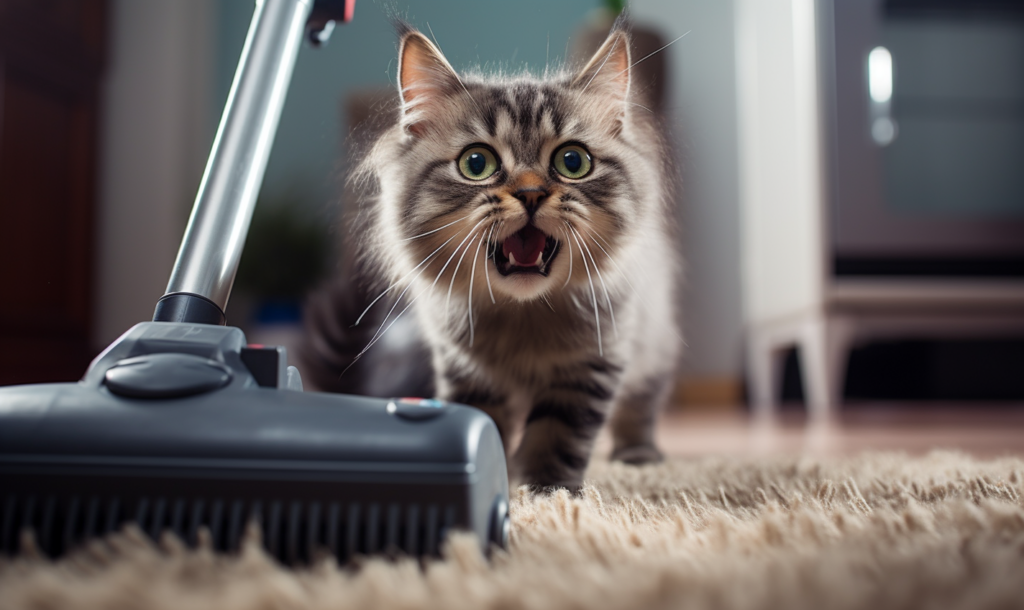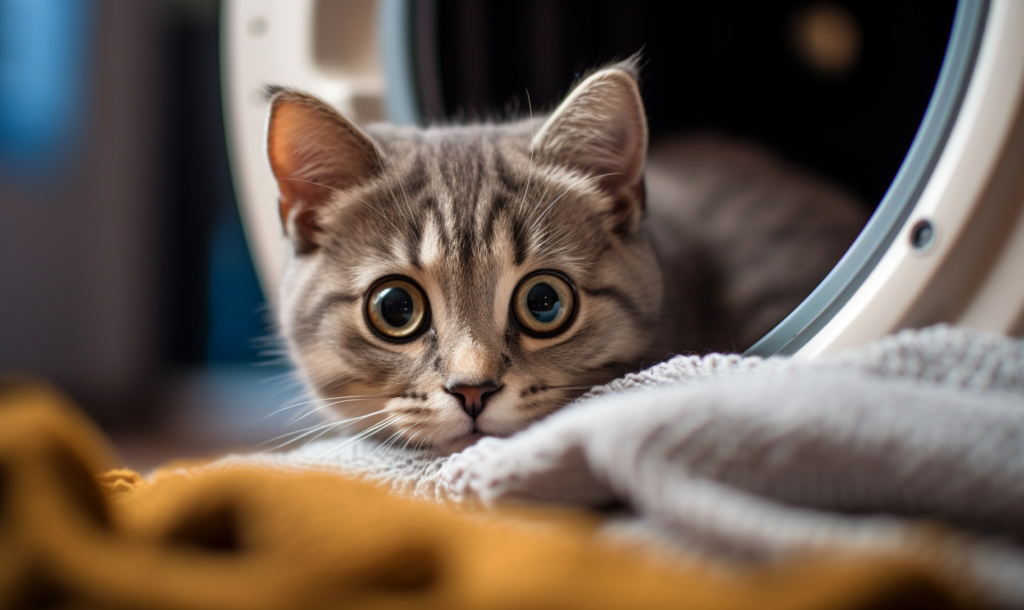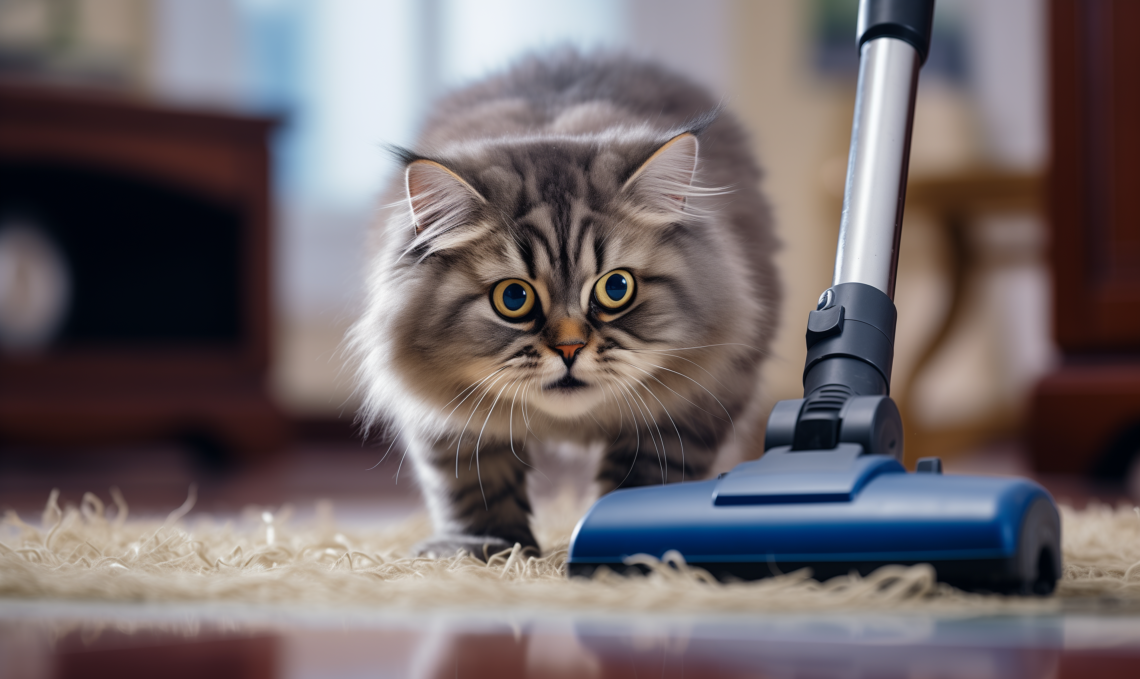Many cat parents want to understand why are cats scared of vacuums. Cats often develop a fear of vacuums due to their loud noise. If a cat is startled by a vacuum for the first time, this fear can become deeply ingrained. As a result, they may start fearing the mere sight of it in future encounters
You might wonder why cats are so frightened of loud noises. The reason is quite straightforward: loud sounds trigger their survival instincts. In the wild, such noises often signal danger, making cats instinctively feel threatened and on high alert.
This instinctive reaction is key to understanding why cats are scared of vacuums. In this article, we’ll delve into both the psychological and behavioral aspects of this fear and provide strategies to help your cat overcome their anxiety.
How To Help Your Cats If They Are Scared Of Vacuums
We are thinking that you might not really want to give up vacuuming the cat litter mess and your house overall and we will therefore present some alternatives that you can do to help alleviate their fears.
The key is to gradually acclimate your cat to the vacuum’s presence. Your first best option is to just move your cat to a further room or place from where you are vacuuming at the moment, such as your bedroom, your yard, or if they are an outdoor cat, you can just let them out at the time you are vacuuming.
However, the best way to battle this fear is to train them to not fear the vacuum. If there is no actual reason for your cat to be frightened, you can put some effort on trying to eliminate this fear by training them with treats, although this method will surely take much more of your time and effort.

Training Your Cat To Live With A Vacuum
Here’s what you can do. Try leaving your vacuum in the same room where your cat is or where it can be visible to them as they pass by or stay in that area. This exposure will help your cat become accustomed to the vacuum’s presence without associating it with noise or movement. This is to help your cat to get used to the presence of the vacuum while it is not in operation.
Next step can be that you can try to bring your cat near the vacuum and to try petting him for a while and maybe give him a treat if he/she stays calm around it. Make sure that he/she is comfortable around it while you are near it. However, if your cat starts showing signs of distress, do not force him/her to stay near the vacuum as it might cause him more fear towards it. Let him rest for a while from this training session, and remember to never give him treats during this moment. Repeat this method until he gets used to being around it while it is turned off.
Next up, you can try to turn the vacuum on while the cat is in a different room and let him just get used to the faint sound for now. Give him/her treats if his/her behavior remains calm and not showing any distress and fear. Keep doing this training until he/she gets used to the sound it makes while being far away.
The next step involves a similar method, but with the cat in the same room as the vacuum. If your cat shows signs of fear or distress, attempt to soothe them. If calming efforts are unsuccessful, take a break and resume later. On the other hand, reward your cat with treats and affection if they remain calm and relaxed.
Continue this practice until your cat becomes accustomed to the presence of the vacuum while it’s running. Once they are comfortable, you can gradually start moving the vacuum around the room during these sessions. If your cat stays relaxed, reward them with treats. This reinforces positive behavior, teaching them there’s nothing to fear.
Always provide an escape route for your cat. This helps them feel they have control over the situation and can leave if they feel too stressed. They can find a place where they feel safe and sheltered.

Some cats feel safer in high places so you may want to consider purchasing a climber because cats would naturally climb up a tree or other structures in the wild in case they feel any type of potential threat or hear loud noises.
The key is to be patient, gentle, and consistent in your approach. If however your cat’s fear seems severe or they don’t improve, consider consulting a veterinarian or behaviorist for tailored advice.
Final Thoughts About Why Are Cats Scared Of Vacuums
Understanding and addressing your cat’s fear of vacuums is crucial for their well-being. It’s important to recognize that their fear is a natural response to a perceived threat. The loud and unfamiliar sounds of vacuums often trigger a fear response, making cats scared of vacuums. While gradual desensitization and positive reinforcement can often help in reducing this fear, it’s vital to approach this process with patience and empathy.
If your efforts at training do not yield the desired results, remember that forcing your cat to endure the stress of a vacuum can have negative psychological effects. Instead, providing them with a safe space or allowing them the freedom to escape the noise is a kind and effective approach. This respects their natural instincts and ensures they feel secure.
Ultimately, every cat is unique, and what works for one may not work for another. Your understanding and thoughtful approach to your cat’s fears can significantly enhance the bond you share, creating a harmonious and stress-free environment for your beloved feline companion.
RELATED: Can You Vacuum Cat Litter?







Leave a Comment